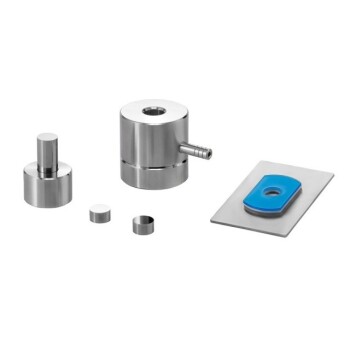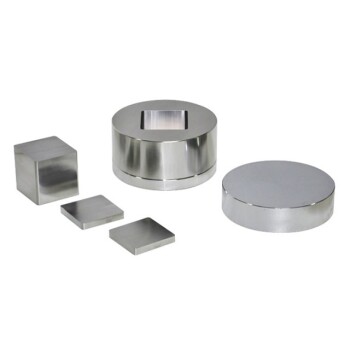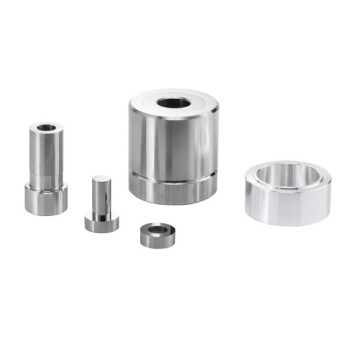At its core, a hydraulic press operates on Pascal's Law. This physical principle states that when pressure is applied to a confined, incompressible fluid, that pressure is transmitted equally and undiminished to all parts of the fluid and the walls of its container. This allows a small input force on a small area to generate a massive output force on a larger area.
The central concept is force multiplication. By using a confined fluid, a hydraulic press trades a long-distance movement of a small piston for a short-distance, high-force movement of a large piston, effectively amplifying the initial effort.

How Pascal's Law Creates Force Multiplication
Pascal's Law is not just an abstract theory; it has a direct and tangible application in the design of every hydraulic press. The system is engineered specifically to exploit this principle.
The Core Principle: Constant Pressure
The foundation of the system is a fluid (typically oil) in a sealed, closed circuit. When force is applied to one part of this circuit, it creates pressure.
According to Pascal's Law, this pressure (P) is constant everywhere within the fluid. Pressure is defined as Force (F) divided by Area (A).
The Two-Piston System
A hydraulic press uses two pistons of different sizes that are connected by the fluid-filled system.
A small input force (F1) is applied to a small piston with a small surface area (A1). This creates a specific pressure in the fluid (P = F1 / A1).
The Mathematical Advantage
This same pressure is transmitted through the fluid to a much larger piston (the ram) with a larger surface area (A2).
Because the pressure is constant (P), the resulting output force (F2) on the large piston is equal to that pressure multiplied by its area (F2 = P * A2). Since A2 is much larger than A1, F2 becomes significantly greater than the initial force, F1.
Key Components of a Hydraulic System
The practical application of Pascal's Law relies on a few critical components working in unison.
The Input Piston (Plunger)
This is the smaller piston where the initial, manual or low-power mechanical force is applied. It travels a relatively long distance to displace the hydraulic fluid.
The Output Piston (Ram)
This is the larger piston that receives the transmitted pressure. Its large surface area is what multiplies the force, allowing it to perform heavy work like crushing, bending, or forming materials.
The Hydraulic Fluid
An incompressible fluid, usually a specialized oil, acts as the medium for transmitting pressure. Its inability to be compressed is what ensures the pressure is transferred efficiently from the input to the output piston.
The Power System
This system, which includes a pump and motor, is what pressurizes the hydraulic fluid. The fluid is then directed by control valves into the cylinder, driving the piston to generate the required force for the pressing operation.
Understanding the Trade-offs: Force vs. Distance
The force multiplication achieved by a hydraulic press is not "free energy." It comes with a necessary and predictable trade-off governed by the laws of physics.
The Law of Conservation of Work
Work is defined as Force multiplied by Distance. In an ideal system, the work you put in must equal the work you get out.
To generate a massive output force, the output piston can only move a very short distance. Conversely, the small input piston must travel a much longer distance to displace enough fluid to make that happen.
The Practical Advantage of Reduced Effort
This trade-off is highly desirable. It makes tasks that would require immense and impractical human effort—like forming sheet metal or preparing compressed samples in a lab—entirely manageable.
The system allows an operator to apply a small, comfortable force over a longer movement to produce a huge, short-range force. This enhances repeatability and reduces the variability and fatigue associated with purely manual presses.
When to Leverage Hydraulic Power
Choosing a hydraulic system is about matching its core principle to your specific goal.
- If your primary focus is generating immense force: Hydraulic presses are the ideal solution for applications like forging, molding, and heavy-duty material compression.
- If your primary focus is precision and repeatability: The smooth, controllable pressure of a hydraulic system provides a level of consistency that is very difficult to achieve manually.
- If your primary focus is reducing operator fatigue: Hydraulic systems dramatically lower the physical effort required to apply significant force, improving ergonomics and long-term productivity.
By understanding this principle of force multiplication, you can apply immense power with precision and control.
Summary Table:
| Aspect | Details |
|---|---|
| Core Principle | Pascal's Law: Pressure in a confined fluid is transmitted equally, enabling force multiplication. |
| Key Components | Input piston (plunger), output piston (ram), hydraulic fluid, power system (pump, motor, valves). |
| Force Multiplication | Small input force on small area generates large output force on large area (F2 = P * A2). |
| Trade-offs | Increased force results in reduced distance moved by the output piston, conserving work. |
| Applications | Forging, molding, material compression, lab sample preparation with high precision and repeatability. |
Unlock Precision and Power in Your Laboratory with KINTEK
Are you looking to enhance your lab's capabilities with reliable, high-force equipment? KINTEK specializes in lab press machines, including automatic lab presses, isostatic presses, and heated lab presses, designed to deliver superior performance for tasks like material compression and sample preparation. By leveraging advanced hydraulic principles, our products ensure precise control, reduced operator fatigue, and consistent results, helping you achieve efficiency and accuracy in your research or production processes.
Don't let manual efforts limit your potential—contact us today to discuss how our solutions can meet your specific laboratory needs and drive your success forward!
Visual Guide

Related Products
- Laboratory Hydraulic Press 2T Lab Pellet Press for KBR FTIR
- Automatic Laboratory Hydraulic Press Lab Pellet Press Machine
- Laboratory Hydraulic Press Lab Pellet Press Button Battery Press
- Manual Laboratory Hydraulic Press Lab Pellet Press
- Manual Heated Hydraulic Lab Press with Integrated Hot Plates Hydraulic Press Machine
People Also Ask
- How do hydraulic press machines ensure precision and consistency in pressure application? Achieve Reliable Force Control for Your Lab
- How is a laboratory hydraulic press used for Tb(III)-Organic Framework FT-IR samples? Expert Pellet Pressing Guide
- What role does a high-pressure laboratory hydraulic press play in KBr pellet preparation? Optimize FTIR Accuracy
- How are hydraulic presses used in spectroscopy and compositional determination? Enhance Accuracy in FTIR and XRF Analysis
- What role does a laboratory hydraulic press play in carbonate powder prep? Optimize Your Sample Analysis



















